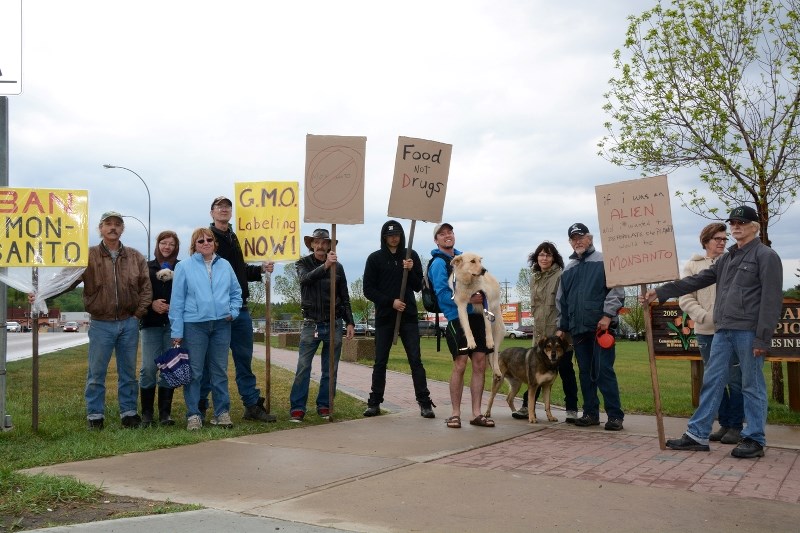Athabasca joined hundreds of cities in dozens of countries worldwide on May 25 to protest against the practices of one company and its stake in genetically modified (GM) food production.
Demonstrators parked themselves on Highway 55 across from the Husky Station in Athabasca May 25 to protest multinational biotech corporation Monsanto's alleged use of genetically modified organisms (GMOs) in food crops.
"We want GMO-labelling in all of our grocery products. We want to know what we're buying," said farmer Chris Pitman, who was demonstrating, claiming there is no GMO labelling on grocery products.
"You buy a bag of taco chips, where do you think your corn is coming from?" said Pitman.
Monsanto is a multinational biotechnology and agricultural Fortune 500 company that boasts more than 21,000 employees and 404 facilities in 66 countries worldwide, according to the company's website.
"It is our purpose to work alongside farmers Ö selling seeds, traits developed through biotechnology, and top protection chemicals," reads the website. "The challenge: meeting the needs of today while preserving the planet for tomorrow."
Monsantoís Trish Jordan said the decision to label GM foods is not Monsanto's call, but that foods should be labeled if there is any safety concern.
If that safety concern includes any "impact, potentially, on human health, then obviously food should be labeled in that respect," said Jordan.
Jordan said Monsanto has been given the rubber stamp of approval by many industry experts.
She continued, "the safety of our products, and when you look at all of the scientific experts, and the governments, and the regulatory agencies around the world ó they have determined that Ö ingredients developed using biotechnology or genetic modification are safe."
"If they're safe, why would you label them?" concluded Jordan, who acknowledged Monsanto holds various patents on its biotechnology used in seed production, not uncommon for many companies.
"The role of a patent is to encourage innovation, and innovation is truly the lifeblood of improving our society," said Jordan.
However, Monsanto has said that "GMO foods" is an ambiguous term because it is not poultry or beef that is GM, it is the grain that fed the animal. Monsanto's response to the public's safety concerns is that farmers who do not feel safe using their products will find comfort in a competing product.
"All of our products are labeled. Our seeds are labeled, our technology is labeled, and our chemistries are labeled. They have to be, it's a regulatory requirement," said Jordan.
But that didnít comfort Pitman and his friends as they demonstrated their belief that biotechnology doesn't belong in food crops.
"I don't want my food supply to be controlled by a chemical company," said Mark Sheppard, another demonstrator. "It just doesn't go hand in hand, as far as I'm concerned, and how they are monopolizing the seed.î
Monsanto prides itself on helping farmers build an economically sustainable business, but many of the company's critics point to its history not only in the agriculture business but also in the pharmaceuticals and chemical business.
Monsanto's various brands include "Genuity" and "Roundup Ready" products to improve yields of such crops as alfalfa, canola, corn, cotton, sorghum, soybeans, sugar beets and wheat.
"Since this has been going on, there are 189 weeds that are nationally showing resistance to herbicides," claimed Sheppard.
Sheppard believes the human consumption of GM foods is a "major health concern" because "none of it has been researched enough."
Monsanto draws from extensive expert backing on food safety, including a 2008 report from the European Food Safety Authority (EFSA) entitled "Safety and nutritional assessment of GM plants and derived food and feed: The role of animal feeding trials."
The report states, "the safety assessment of GM plants and derived food and feed follows a comparative approach, i.e. the food and feed are compared with their non-GM counterparts in order to identify intended and unintended differences which subsequently are assessed with respect to their potential impact on the environment, safety for humans and animals, and nutritional quality."
Jordan said Monsanto is not a food company, but Sheppard remains concerned about the seeds and grains going into his food.
Asked what message he is trying to send Monsanto, Sheppard said, "give back our food, and stop messing with it."



